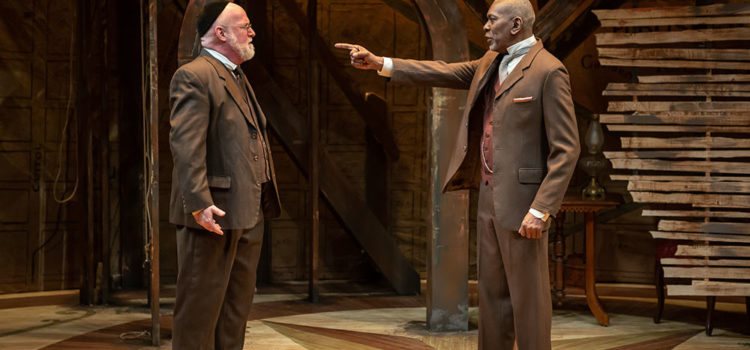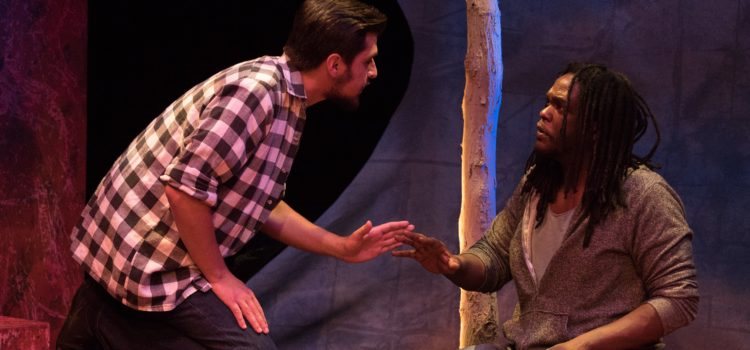By Lynn Venhaus Managing Editor A brilliantly staged and acted “District Merchants” raises timely questions on oppression in a modern reworking of Shakespeare’s 420-year-old “Merchant of Venice.”
Playwright Aaron Posner’s 2016 comedy-drama tweaks the characters,
and sets them in the post-Civil War reconstruction era of 1870, in the nation’s
burgeoning capital, Washington D.C. Scenes also take place in Belmont, Mass.
It was a time of transition – out of ruins came renewal. But
it wasn’t fast or smooth. Posner has us confront the fact that old habits die
hard, change isn’t easy, and our tribes continue to define us, so is all the
uneasy historical issues and disastrous conflicts really in our past? The
clashes could be viewed as somewhat contemporary.
In this New Jewish Theatre production, butting heads are a Jewish immigrant moneylender, Shylock, and black businessman Antoine, shrewdly played by Gary Wayne Barker and J. Samuel Davis respectively, in skillfully calibrated performances.
Antoine has borrowed money from Shylock, but because of a
series of events not his doing, must default. Will he be required to hand over
a “pound of flesh,” as demanded by the loaner? A trial will ensue, but there
will be fireworks in and out of the courtroom regarding power, race, position,
family and loyalty.
The incredibly dynamic duo of Barker and Davis, longtime
local mainstays, spars so convincingly and with such verve that you hang on to
every word and nuance. Their timing is so impeccable that the audience broke
into applause after a couple explosive scenes.
Their triumphant pairing is potent – arguably career best
— but the supporting characters, involved in several thorny romantic subplots,
are exceptional as well.
The noteworthy ensemble has created memorable characters
that also mesh as a unit – even with the conflicts. They project a vibrancy,
with much thought into their role’s development.
Courtney Bailey Parker and Rae Davis. Photo by Eric WoolseySteadfast Courtney Bailey Parker is a strong Portia, who
dresses like a man to audit law classes at Harvard and is striving to define
her role as a smart woman in 19th century America.
She pairs well with love interest Benjamin, a black man
passing for white, and their courtship has a larger context. Rob White is solid
as an agent of change.
Standing out is Rae Davis as Portia’s servant Nessa, and she has stood out in two other plays she was in last year (“Cold,” “The Last Days of Judas Iscariot”), her first in regional St. Louis theater. She has a delightful way with dialogue, as does the sublime Karl Hawkins, who is dandy as Shylock’s servant Lancelot.
Karl Hawkins as Lancelot in “District Merchants.” Photo by Eric WoolseyHawkins charms in every scene, as does Paul Edwards as
Finn, an Irish produce salesman who takes a shine to Shylock’s sheltered
daughter Jessica. At first, his brogue was wobbly, but he grew better, and his
winning personality was enough to endear.
As delicate Jessica who transforms with determination, Alicen
Moser understands the frustration of being a powerful and overprotective father’s
only child. When she rebels, she does it in a big way that nearly destroys her
father.
The relationships are complicated, but this cast pulsates under Jacqueline
Thompson’s perceptive direction.
Thompson has directed this show with such vigor that each
character has a distinct understanding of the material, and with her innovative
touches, has achieved a masterpiece.
She has astutely woven each character into this tapestry, and moves them around
the stage, the striking multi-level set by David Blake, and into the audience
with such purpose — a flow that keeps
us riveted.
It does not matter if you have never seen Shakespeare’s
most controversial play. “District Merchants” flips it to assure that we see
the maligned, marginal groups in a different perspective – people of faith, of
color, of origin. We look at mercy in a fresh way.
Posner’s unflinching dialogue about stereotypes is tough
stuff, pitting Jews against gentiles, blacks vs. whites, and Irish vs. other
ethnic groups.
Billed as an “uneasy comedy,” you wouldn’t ever regard such
thought-provoking material that tackles racism, bigotry and xenophobia as a
laugh-riot, but there are surprising comic bits that struck a chord with the
audience, a spoonful of sugar if you will. After all, Shakespeare did consider
“Merchant of Venice” one of his comedies.
But mostly, the humor derives from the spoken thoughts and
feelings of the characters, who want basically what everyone wants and how they
tell their story. Because of the caliber of this cast, we are quickly drawn
into this period, and become emotionally invested as well.
Posner’s work appears to be a winner with New Jewish
Theatre. “Life Sucks!,” his comical adaptation of Chekhov’s “Uncle Vanya,” was
a delightful presentation last spring, and nominated for multiple St. Louis
Theatre Circle Awards (coming up March 25).
This must-see production has raised the bar – and will be a
measuring stick for this year’s offerings, especially with such a harmonious
ensemble.
A work of stunning achievement all the way around – with
beautifully accented lighting by Sean Savoie, richly detailed period costumes
by Felia Davenport and sound design by Zoe Sullivan.
“District Merchants” is presented by New Jewish Theatre from Jan. 24 – Feb. 10 on Wednesday, Thursday, Saturday and Sunday at the Wool Theatre at the Jewish Community Center, Creve Coeur. For tickets, visit www.newjewishtheatre.org

Lynn (Zipfel) Venhaus has had a continuous byline in St. Louis metro region publications since 1978. She writes features and news for Belleville News-Democrat and contributes to St. Louis magazine and other publications.
She is a Rotten Tomatoes-approved film critic, currently reviews films for Webster-Kirkwood Times and KTRS Radio, covers entertainment for PopLifeSTL.com and co-hosts podcast PopLifeSTL.com…Presents.
She is a member of Critics Choice Association, where she serves on the women’s and marketing committees; Alliance of Women Film Journalists; and on the board of the St. Louis Film Critics Association. She is a founding and board member of the St. Louis Theater Circle.
She is retired from teaching journalism/media as an adjunct college instructor.


